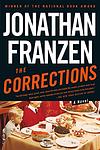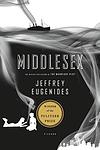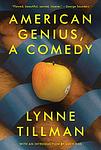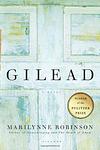The Millions: The Best Fiction of the Millennium
This is one of the 284 lists we use to generate our main The Greatest Books list.
-
The Corrections by Jonathan Franzen
The novel revolves around the lives of the Lambert family, an old-fashioned midwestern couple and their three adult children. The parents, Alfred and Enid, are dealing with Alfred's Parkinson's disease and their own marital problems, while their children are each facing their own personal and professional crises. The narrative explores the themes of family dynamics, societal expectations, and the struggles of modern life. The story climaxes with the family's last Christmas together at their childhood home.
-
The Known World by Edward P. Jones
"The Known World" is a historical novel set in antebellum Virginia, exploring the complex relationships between slaves, free blacks, and whites. The story revolves around a black man who becomes a slave owner, his wife, and their slaves. It provides a unique perspective on the moral complexities and personal consequences of slavery, while also examining the intricate social hierarchy of the time. The narrative is filled with richly drawn characters, each with their own stories and struggles, offering a vivid portrayal of a little-known aspect of American history.
-
Cloud Atlas by David Mitchell
This novel is a unique blend of six different stories, each set in a different time and place, spanning from the 19th century South Pacific to a post-apocalyptic future. Each tale is written in a different style, reflecting the time and setting it represents, and they are all connected through shared themes and recurring motifs. The stories are nested within each other, with each interrupted by the next, only to be concluded in the second half of the book. The novel explores themes of predacity, civilization, reincarnation and the eternal recurrence of the same behaviors throughout history.
-
2666 by Roberto Bolaño
The novel is a sprawling, ambitious work that spans continents and time periods, centering around an elusive, reclusive German author. It intertwines five different narratives: a group of European academics searching for the author, a professor in Mexico dealing with his own personal crises, a New York reporter sent to cover a boxing match in Mexico, an African-American journalist in Detroit, and the horrifying and unsolved murders of hundreds of women in a Mexican border town. The narratives are linked by themes of violence, mystery, and the search for meaning in a chaotic world.
-
Pastoralia by George Saunders
"Pastoralia" is a collection of six short stories, each delving into the world of weird, dystopian future and highlighting the author's satirical and surreal take on modern life. The stories are set in bizarre environments and situations, such as a couple working as cavemen in a theme park, a male stripper trying to help his mentally ill sister, and a corporate drone receiving cryptic messages from his boss. The characters in these stories struggle with their personal problems while navigating through the absurdity of their surroundings, showcasing the author's unique blend of humor, empathy, and social commentary.
-
The Road by Cormac McCarthy
In a post-apocalyptic world, a father and his young son journey through a desolate landscape, struggling to survive. They face numerous threats including starvation, extreme weather, and dangerous encounters with other survivors. The father, who is terminally ill, is driven by his love and concern for his son, and is determined to protect him at all costs. The story is a haunting exploration of the depths of human resilience, the power of love, and the instinct to survive against all odds.
-
Austerlitz by W. G. Sebald
The novel follows the story of Jacques Austerlitz, an architectural historian who was brought to England on a Kindertransport from Czechoslovakia during World War II. As an adult, Jacques embarks on a journey to uncover his past, including his original identity, his parent's fate, and his own lost history. The narrative is a haunting exploration of memory, identity, and the lasting impact of the Holocaust.
-
Out Stealing Horses by Per Petterson
The novel is a poignant exploration of a man's relationship with his father and his own identity. Set in Norway, it follows the protagonist's decision to live in solitude after the death of his wife and sister. Through a series of flashbacks, he recalls his childhood, particularly the summer of 1948 when he lived with his father in the country. As he delves into his past, he uncovers his father's involvement in the resistance during World War II and the lasting impact it had on their relationship and his own life. The narrative intertwines the past and the present, reflecting on themes of loss, betrayal, and the complexity of human relationships.
-
Hateship, Friendship, Courtship, Loveship, Marriage by Alice Munro
"Hateship, Friendship, Courtship, Loveship, Marriage" is a collection of nine short stories that explore the complexities of human relationships. Each story delves into the intricate web of emotions and experiences that define the human condition, including love, hate, friendship, courtship, and marriage. The characters are rendered with depth and nuance, their lives marked by moments of profound change and subtle transformation. The stories are set against the backdrop of rural and urban landscapes, offering a rich, evocative portrayal of life in all its complexities and contradictions.
-
Never Let Me Go by Kazuo Ishiguro
The novel is a haunting tale of three friends, who grow up together at a seemingly idyllic English boarding school. As they mature, they discover a dark secret about their school and the purpose of their existence, which is to become organ donors for the rest of society. The story is a profound exploration of what it means to be human, the morality of scientific innovation, and the heartbreaking reality of love and loss.
-
The Brief Wondrous Life of Oscar Wao by Junot Diaz
This novel tells the story of Oscar de Leon, an overweight Dominican boy growing up in New Jersey who is obsessed with science fiction, fantasy novels, and falling in love, but is perpetually unlucky in his romantic endeavors. The narrative not only explores Oscar's life but also delves into the lives of his family members, each affected by the curse that has plagued their family for generations. The book is a blend of magical realism and historical fiction, providing a detailed account of the brutal Trujillo regime in the Dominican Republic and its impact on the country's people and diaspora.
-
Twilight of the Superheroes by Deborah Eisenberg
"Twilight of the Superheroes" is a collection of six short stories that explore the complexities of modern life and relationships. Each story offers a unique perspective on themes such as love, loss, identity, and the passage of time. The characters are often faced with moral dilemmas and personal crises, and their struggles are set against the backdrop of significant historical events. The narrative style is characterized by its intricate detail and psychological depth, providing a thoughtful examination of the human condition.
-
Mortals by Norman Rush
"Mortals" is a complex narrative about a Milton scholar and CIA operative named Ray Finch stationed in Botswana. The story explores his personal struggles with his marriage, his brother's death, and his professional life. The narrative also delves into his philosophical and psychological musings, providing a deep exploration of his character. The book presents a rich tapestry of African politics, CIA covert operations, and the human condition, all set against the backdrop of Botswana.
-
Atonement by Ian McEwan
Atonement is a powerful novel that explores the consequences of a young girl's false accusation. The narrative follows the lives of three characters, the accuser, her older sister, and the sister's lover, who is wrongly accused. This false accusation irrevocably alters their lives, leading to the accused's imprisonment and eventual enlistment in World War II, while the sisters grapple with guilt, estrangement, and their own personal growth. The novel is a profound exploration of guilt, forgiveness, and the destructive power of misinterpretation.
-
Varieties of Disturbance: Stories by Lydia Davis
"Varieties of Disturbance" is a collection of short stories that delve into the human psyche, exploring the complexities of emotions and relationships. The narratives range from the mundane to the profound, often focusing on seemingly insignificant moments that reveal deep insights into the human condition. The author's unique style blends humor, melancholy, and sharp observations, resulting in a thought-provoking and emotionally resonant collection.
-
Middlesex by Jeffrey Eugenides
The book follows the life of Calliope Stephanides, a Greek-American hermaphrodite, who narrates her epic story starting from her grandparents' incestuous relationship in a small village in Asia Minor to her own self-discovery in 20th century America. The novel delves into themes of identity, gender, and the American dream, while also providing a detailed history of Detroit through the eyes of three generations of an immigrant family.
-
The Fortress of Solitude by Jonathan Lethem
The novel follows the lives of two boys growing up in Brooklyn, New York in the 1970s. Despite their racial differences, one being white and the other black, they form a deep friendship bonded by their shared interest in comic books, music and a magical ring that grants them superpowers. As they grow older, their paths diverge due to their racial and societal differences, with one becoming a successful music journalist and the other succumbing to a life of crime. The book is a profound exploration of race, identity, friendship and the impact of gentrification.
-
Stranger Things Happen by Kelly Link
"Stranger Things Happen" is a collection of 11 captivating short stories that blend elements of horror, fantasy, and fairy tales. The narratives are filled with strange events and characters, such as a husband who disappears every time he goes for a swim and a TV show where ghosts are the main characters. The book explores the boundaries of reality and the supernatural, creating an eerie, dream-like atmosphere that leaves the reader questioning what is real and what is not.
-
American Genius: A Comedy by Lynne Tillman
This novel follows the thoughts and observations of a woman living in a residential institution that houses great minds of various fields. The protagonist's thoughts weave in and out of topics such as skin, Native American history, cats, Zeno's paradoxes, and so on, in a stream-of-consciousness style. The narrative reflects on American history, culture, and society through the lens of a unique, intellectual, and possibly unstable mind.
-
Gilead by Marilynne Robinson
The novel is a series of reflections written by an elderly dying pastor in 1956 in Gilead, Iowa, as a letter to his young son. The protagonist, John Ames, shares his family history, personal thoughts, and the struggles of his life, including the tension with his namesake and godson who returns to their small town. The book explores themes of faith, regret, and the beauty of existence, providing a profound meditation on life and death.
The Millions, 20 Books
A poll of The Millions contributors and 48 of their favorite writers, editors, and critics, asking a single question: “What are the best books of fiction of the millennium(2000), so far?” The results were robust, diverse, and surprising.
Added almost 10 years ago.
This list has a weight of 52%. To learn more about what this means please visit the Rankings page.
Here is a list of what is decreasing the importance of this list:
- List: only covers 10 years
- Voters: are mostly from a single country/location
If you think this is incorrect please e-mail us at [email protected].



















